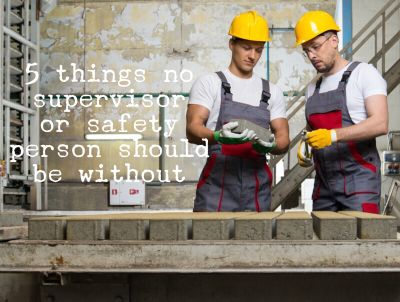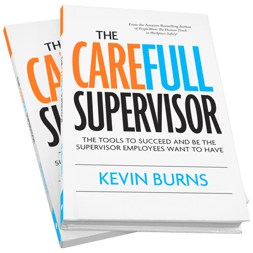Front-line supervisors and safety people have the most challenging positions in any organization.
 Front-line supervisors and safety people have the most challenging positions in any organization. Most do it with little management or supervisory skills training. It's tough to stumble around in a job trying to find your voice and management style. Yet, supervisors and safety people do it. They manage the heart and soul of production and must get exceptional safety performance.
Front-line supervisors and safety people have the most challenging positions in any organization. Most do it with little management or supervisory skills training. It's tough to stumble around in a job trying to find your voice and management style. Yet, supervisors and safety people do it. They manage the heart and soul of production and must get exceptional safety performance.
If this is you, here are five things you need to acquire to become more effective at the job:
1Listening Skills. Are you really listening? Because this is not as easy as it seems. Most people don't listen to understand. They listen so that they can respond. That’s exactly what you do. So while someone else is talking, you're planning what you're going to say in response. That's not listening. There is no way you can listen, hear and understand while your brain is formulating the next brilliant thing to say. Stop. Listen. Make eye contact. Hear. Understand. Then take a few moments to consider your response.
2Priority skills. This is the ability to separate what is of utmost importance from what is merely urgent. No, the job is not the priority. The project is not the priority. The deadline is not the priority. The priority is the people doing the job, the people working on the project and the people meeting the deadline. There is nothing that takes priority over someone's health and well-being. Nothing. And that includes pushing people to get production so that you avoid getting into trouble with your boss. Your people are always the priority. When your people are your only priority, your people-view and your decision-making shifts.
3Communication skills. Any supervisor or safety manager depends on clear, concise and appropriate communication. The employee depends on it too. In fact, no performance improves without feedback and communication. A supervisor lacking in communication skills gets marginal results. A supervisor with effective communication skills gets exceptional results. Just because you don't have any problem talking doesn't mean you're an effective communicator. Communication is more than just talking. Never cracked open a book or taken a course on effective communication? How can you know whether you’re effective or not? Let’s just assume that you have lots left to learn about communication.
4Motivation and inspiration skills. An athlete looking to win a gold medal has more motivation than an athlete who is just looking for competition experience. Motivation improves performance. Using your communication skills, you can effect better performance through inspiration and motivation. But, you can't motivate someone else. They motivate themselves and will do so in response to being inspired. You can inspire others once you determine what their motivations are for safety. Figure out what they want out of life. Then, determine how the safety program helps them get it. Then, inspire them to want to motivate themselves to get on-board with safety.
5A mentor. You didn't take the job in safety and supervision to make friends. That doesn't mean you won't ever make any friends on the job. But safety and supervision can be lonely positions. It is especially noticeable when it feels like you’re not getting through to them. At that point, supervisors and safety people will need someone to talk to. Having someone to bounce ideas off of, to get feedback and to help you sort through issues is essential. Find yourself a mentor; someone who you can emulate and be honest with. Having someone in your corner who has walked in your shoes can be very helpful. They can help you with context and decision-making and give you ideas and strategies to get through the tough days.
 The front-line is where the most work happens, where the most people are and where the most incidents occur. If you’re going to be responsible for maintaining solid performance, you need skills to be able to do it.
The front-line is where the most work happens, where the most people are and where the most incidents occur. If you’re going to be responsible for maintaining solid performance, you need skills to be able to do it.
You wouldn’t let a greenhorn worker drive a piece of heavy equipment without proper training would you? Why do you think you don’t need interpersonal skills to manage those same people? If you've never had formal training or education in these skills, then get yourself to the bookstore today. Stand in front of the management or leadership section and wait for one book to catch your eye (or call your name). Buy it. Then read it. All of it. Cover to cover. Then, go back to the bookstore and do it again.
Kevin Burns gives engaging, entertaining and inspiring speeches to front-line employees at safety meetings. He also works with supervisors and safety managers on-site or in keynote presentations at conferences. He is an expert in how to get through to people. Kevin helps organizations integrate caring for and valuing employees through their safety programs. Kevin Burns is a management consultant, safety speaker and author of "The Perfect Safety Meeting" and "Running With Scissors - 10 Reasons To Invest in Safety In Slow Times."
(c) Can Stock Photo

